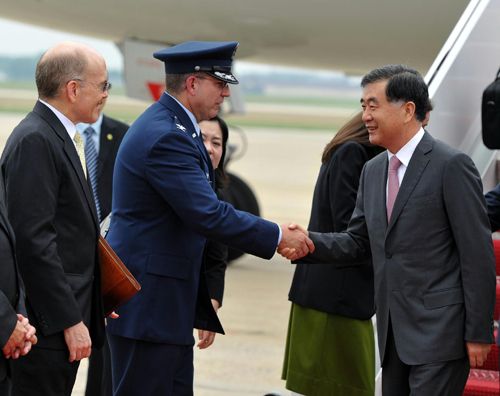汪洋在美國《華爾街日報》發表署名文章(全文)
Full text: Wang Yang's signed article on The Wall Street Journal
|
|
| 7月9日,中國國家主席習近平的特別代表、國務院副總理汪洋(右一)抵達美國華盛頓安德魯空軍基地。當天下午,由中國國家主席習近平的特別代表、國務院副總理汪洋和國務委員楊潔篪率領的中國代表團抵達華盛頓,將參加于10日至11日在此間舉行的第五輪中美戰略與經濟對話。[新華社 記者 王雷攝] Acting as special representatives of Chinese President Xi Jinping, Vice Premier Wang Yang (1st R) and State Councilor Yang Jiechi (Unseen) arrive in Washington, the United States, for the fifth China-U.S. Strategic and Economic Dialogue (S&ED), on July 9, 2013. A Chinese delegation led by Wang Yang and Yang Jiechi arrived here Tuesday for the fifth China-U.S. S&ED, which will start Wednesday. [Xinhua] |
|
《加強對話 促進合作》 第五輪中美戰略與經濟對話將于7月10日至11日在華盛頓舉行,這是習近平主席與奧巴馬總統安納伯格莊園會晤后,兩國政府圍繞著構建中美新型大國關系邁出的重要一步。
越來越多的中國企業到美國投資興業。中國萬向集團在美國13個州設廠,雇傭當地員工12000多人。在中國投資的美資企業累計逾6萬家。麥當勞、沃爾瑪、星巴克遍布中國大街小巷,微軟軟件、蘋果手機、通用汽車走進中國千家萬戶。中美經貿合作的不斷深化,有力地推動了兩國經濟發展,促進了就業增加,給兩國人民帶來了實實在在的利益。 中美經貿合作的發展也伴隨著一些爭議和質疑。比如,有的美國人抱怨,中國人搶走了我們的就業機會,中國企業偷走了我們的知識產權。而有的中國人則經常問,為什么美國積極擴大就業,中國企業赴美投資卻屢屢受挫?為什么美國對中美貿易不平衡問題反復提及,卻執意限制向中國出口高新技術產品? 中美兩國差異很大,經濟交往又快速增加,無論是看問題的角度,還是利益摩擦都會導致出現各種不同的聲音,這是正常的。解決爭議、質疑的正確方式只有加強溝通、加深了解、增進互信,所以才需要兩國政府間的經濟對話。從2006年第一次戰略經濟對話至今,兩國的貿易額從2676億美元上升到2012年的近5000億美元。實踐證明,中美經貿關系互利共贏,誰也離不開誰。 擴大開放是中國的基本國策。我們在發展的過程中,借鑒了包括美國在內的世界各國的成功經驗,13億人口的巨大市場潛力不斷釋放。過去5年,中國消費對經濟增長的貢獻率由39.6%增至51.8%;服務業占GDP的比重由41.9%升至44.6%;經常項目順差占GDP的比例由10.1%降至2.3%。未來5年,中國的發展將為美國也為全世界創造更多的商機,中美兩國經貿合作擁有光明的前景。 當前,世界經濟復蘇不穩固、不平衡,機遇和挑戰并存。作為全球最大的發展中國家和發達國家,中美經貿合作不僅造福兩國人民,也有利于世界經濟復蘇與發展。建設相互尊重、合作共贏的新型大國關系,是兩國政府和人民的共識,也是世界的期待。我們要攜手并肩,共同開創中美關系更加美好的明天。 (來源:外交部網站) |
An Opportunity to Strengthen U.S.-China Ties The fifth round of the China-U.S. Strategic and Economic Dialogue will be held in Washington, D.C., on July 10 and 11. It is another important step forward taken by the two governments in their efforts to build a new model of major-country relationship after President Xi Jinping and President Barack Obama met at the Annenberg Estate in California last month. Bilateral business has been the anchor of China-U.S. relations. Over the past 34 years since the establishment of diplomatic ties, two-way trade in goods has increased by 198-fold. China is now the fastest-growing export market for the U.S., and the U.S. is the second-largest trading partner of China after the European Union. A growing number of Chinese enterprises have invested in the U.S. The Wanxiang Group, for instance, has set up 26 automotive-components factories in 13 states and employs more than 12,000 Americans. More than 60,000 U.S. enterprises have invested in China-including McDonald's, Wal-Mart andStarbucks . Many Chinese households use Microsoft software, make calls on Apple iPhones, and drive General Motors cars. Deepening economic ties have boosted the growth of both countries, creating more jobs and bringing tangible benefits to the people of both nations. Yet the expanding business ties have also led to disagreements and doubts. Some Americans have complained that the Chinese have taken their jobs away and that Chinese companies have stolen U.S. intellectual property. And some Chinese wonder why their country's corporate investments in America have suffered setbacks time and again, even as the U.S. is actively trying to expand employment. Why should the U.S. keep talking about its trade imbalance with China while refusing to lift controls on high-tech exports to China? The huge difference between conditions in both nations means that people in each one will naturally see things from different perspectives. When they perceive that the countries' interests do not coincide, friction is inevitable. The only way to resolve such disagreements is to enhance communication, deepen mutual understanding and promote mutual trust. That is why economic dialogue between the governments is needed. Since the first round of the Strategic Economic Dialogue in 2006, bilateral trade has surged to about $500 billion last year, from $267.6 billion. This shows that China and the U.S. are closely connected, and that neither country can thrive without the other. It is China's basic state policy to open wider to the outside world. By learning from the successful experience of the U.S. and other countries, China has unleashed the immense potential of a market with 1.3 billion people. Over the past five years, China's consumption as a share of its GDP shot up to 51.8% from 39.6%, and the share of its service sector rose to 44.6% from 41.9% of GDP. Its current account surplus has dropped to 2.3% of GDP from 10.1%. In the coming five years, China's growth will generate more business opportunities for the U.S. and the world at large. China-U.S. economic cooperation and trade has great prospects. At present, with the global economic recovery remaining unsteady and unbalanced, both nations face challenges as well as opportunities. China is the largest developing country in the world, and the U.S. is the largest developed one. Economic cooperation and trade will benefit our two peoples and contribute to global economic recovery and growth. Building a new model of a major-country relationship based on mutual respect and win-win cooperation is the consensus aim of our two governments and peoples. A bright future awaits China-U.S. relations if we join hands and work together. (Source: fmprc.gov.cn) |
 0
0 







